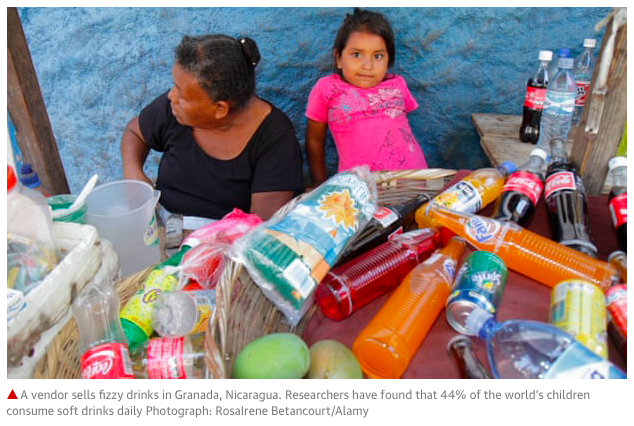'Diabolical' diets: four in 10 children consume sugary drinks daily
 Global study finds one-third of children do not eat fruit daily as countries rich and poor fail to make inroads on malnutrition.
Global study finds one-third of children do not eat fruit daily as countries rich and poor fail to make inroads on malnutrition.
More than four in 10 children drink sugary drinks daily
and one in three do not eat fruit each day, according to a global report that warns most countries are unlikely to meet nutrition targets.
Researchers warn the standard of diets around the world is “diabolical”, and that problems such as obesity, anaemia and micronutrient deficiency are being neglected.
While progress has been made in tackling child stunting, the report provides the most comprehensive picture of diets globally to date, analysing statistics on exclusive breastfeeding, dietary diversity and the consumption of sugary drinks.
“What we highlight in this report is just how important and just how diabolical the state of diets are – whether it’s for infants, young children, adolescents and adults,” said Prof Corinna Hawkes, one of the report’s lead authors, who added malnutrition was a concern in both rich and poor countries.
The global response to tackling malnutrition had been narrowly focused on stunting, ignoring the growing problem of obesity, said Hawkes, director of the centre for food policy at City University of London.
“The world simply has not been paying sufficient attention to diet from the perspective of malnutrition in all its forms,” she said. According to the study, most countries with available data experience more than one form of malnutrition – such as childhood stunting, anaemia in women of reproductive age and obesity .
About 15.95 million children are thought to be affected by wasting and stunting, which increases the risk of child mortality, while 8.23 million children are affected by both stunting and being overweight.
Adults with short stature due to stunted growth are more vulnerable to obesity, especially if they are living in a country where the market for unhealthy, processed foods is rapidly expanded, Hawkes added.
Analysis of over 23,000 packaged food products found the vast majority – 69% – were of relatively poor nutrient quality, according to the report. Nutritional standards for such products were lower in low and middle-income countries. Although sales for packaged foods have stagnated in Europe, North America and Oceania, they continue to grow in Asia and Africa.
The study found about a third (30%) of school-aged children do not eat any fruit daily, yet 44% consume soft drinks every day.
“There’s not any income group that’s eating enough vegetables, whole grains or legumes,” said Hawkes. “This is a problem that goes across income groups in all parts of the world.”
According to the World Health Organization (WHO), 59 countries now have sugar taxes in place, with many more requiring clear food labelling.
Unless greater action is taken by governments, she added, global targets on nutrition are unlikely to be reached, Hawkes added. “We’re going to be living in an obese world where far too many kids are stunted, where – in situation of conflicts - wasting will be going up, disease burden related to non-communicable disease will be diabolical, more young children will be dying,” said Hawkes.
Despite global efforts to tackle stunting, rates remain high. One fifth of children under five years are still affected globally, while demographic changes mean stunting cases in Africa have risen.
Data on infants’ diets shows the proportion of babies aged six months and under who are exclusively breastfed has increased to 41%. Sales of infant formula are growing rapidly.
Fewer than one in five babies aged six months to 23 months eat a minimally acceptable diet, according to the report, while only half children of this age get the recommended minimum number of meals. Progress addressing low weight and anaemia among women has been extremely slow.
The increasingly drawn-out nature of conflicts continued to hinder efforts to tackle malnutrition. There is also a lack of coordination between governments and agencies, said Hawkes. “Crises are protected now, yet you have the humanitarian community going in and dealing with immediate hunger and ignoring other forms of malnutrition which are dealt with by somebody else,” she added.
The report called for greater investment in data collection, especially around micronutrient deficiencies, where there is a lack of information.
At a domestic level, cities should be doing more to promote healthy lifestyles, she added. “There are lots of things that can be done at community level, putting water fountains throughout the city, encouraging walking and physical activity,” she said.
Globally the proportion of people who are overweight or obese has grown year on year since 2000. Women have a higher prevalence of obesity than men, at 15.1% compared with 11.1%.
The report measured progress on nine WHO targets for 2025, including the rates of stunting and wasting among children under five, the proportion of children under five who are overweight, rates of anaemia, exclusive breastfeeding and adult diabetes and adult obesity. Only 94 of 194 countries are on track for at least one of the nine nutrition targets, while no countries are meeting all targets.
Researchers warned it is unlikely countries will reach the sustainable development goal to end malnutrition in all its forms by 2030.









